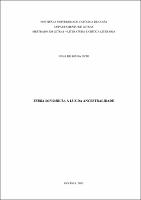| Compartilhamento |


|
Use este identificador para citar ou linkar para este item:
http://tede2.pucgoias.edu.br:8080/handle/tede/3187| Tipo do documento: | Dissertação |
| Título: | TERRA SONÂMBULA À LUZ DA ANCESTRALIDADE. |
| Autor: | Sousa Neto, Julia de  |
| Primeiro orientador: | Machado, Lacy Guaraciaba |
| Primeiro membro da banca: | Lopes, Francisca Rodrigues |
| Segundo membro da banca: | Cezne, Irene Dias de Oliveira |
| Resumo: | O objeto desta pesquisa é o romance Terra sonâmbula de Mia Couto, obra que ficcionaliza tradições e religiosidade africanas, fazendo constantemente referência a elementos como a história oral, a figura da ancestralidade, a magia e a crença na possibilidade de interferir na vida material por meio do uso de forças sobrenaturais. O nosso objetivo é o de mostrar como a ancestralidade é representada no tecido ficcional de Terra sonâmbula. Para tanto, investigamos identidade, tempo, espaço e ancestralidade como modalidades da experiência humana, trabalhadas pelo discurso das personagens, narradores e vozes presentes na narrativa. Dialogamos com autoras como Ângela Bello (1998), Irene Dias de Oliveira (2002), Ana Mafalda Leite (2003), Rita Chaves (2005), entre outros pontos de vista sobre a religião e a ancestralidade, as mudanças relativas ao período colonial e sobre os usos e costumes, o conhecimento e as técnicas dos ritos e mitos africanos. Para explicar, de forma teórica, a presença do sagrado e do profano, questões sobre os mitos, temos Mircea Eliade (2001, 2010, 2012); para falar sobre identidade e cultura, temos Homi Bhabha (2001) e Stuart Hall (2006). Além desses autores, dialogamos com estudiosos da obra de Mia Couto, com o intuito de identificar respostas às nossas indagações sobre Terra sonâmbula à luz da ancestralidade, tema deste trabalho. |
| Abstract: | The object of this study is the novel Terra Sonâmbula, by Mia Couto, which fictionalizes African traditions and religion, referencing elements such as oral history, the figure of ancestry, magic and the belief in the possibility of interfering in material life through the use of supernatural forces. Our goal is to show how the ancestry is represented in the fictional of Terra sonâmbula. Therefore, we investigate identity, time, space and ancestry as modalities of human experience, worked by the speech of the characters, narrators and voices present in the narrative. We dialogue with authors like Angela Bello (1998), Irene Dias de Oliveira (2002), Ana Mafalda Leite (2003), Rita Chaves (2005), among other views on religion and ancestry, changes related to the colonial period and on the uses and customs, knowledge and techniques of African myths and rites. To explain, in a theoretical way, the presence of the sacred, the profane and questions about the myths, we have Mircea Eliade (2001, 2010, 2012); and to talk about identity and culture, we count on Homi Bhabha (2001), and Stuart Hall (2006). Besides these authors, we also dialogue with scholars who study the work of Mia Couto, with the intention of to identify answers to our questions about Terra Sonâmbula on the light of ancestry which is the subject of this work. |
| Palavras-chave: | ancestralidade Literatura africana Mia Couto Processo identitário Terra sonâmbula ancestry African literature Identity process Mia Couto Terra Sonâmbula |
| Área(s) do CNPq: | CNPQ::LINGUISTICA, LETRAS E ARTES::LETRAS |
| Idioma: | por |
| País: | BR |
| Instituição: | Pontifícia Universidade Católica de Goiás |
| Sigla da instituição: | PUC Goiás |
| Departamento: | Ciências Humanas |
| Programa: | Literatura e Crítica Literária |
| Citação: | SOUSA NETO, Julia de. TERRA SONÂMBULA À LUZ DA ANCESTRALIDADE.. 2013. 74 f. Dissertação (Mestrado em Ciências Humanas) - Pontifícia Universidade Católica de Goiás, GOIÂNIA, 2013. |
| Tipo de acesso: | Acesso Aberto |
| URI: | http://localhost:8080/tede/handle/tede/3187 |
| Data de defesa: | 22-Mar-2013 |
| Aparece nas coleções: | Mestrado em Letras |
Arquivos associados a este item:
| Arquivo | Descrição | Tamanho | Formato | |
|---|---|---|---|---|
| JULIA DE SOUSA NETO.pdf | 553,72 kB | Adobe PDF |  Baixar/Abrir Pré-Visualizar |
Os itens no repositório estão protegidos por copyright, com todos os direitos reservados, salvo quando é indicado o contrário.




